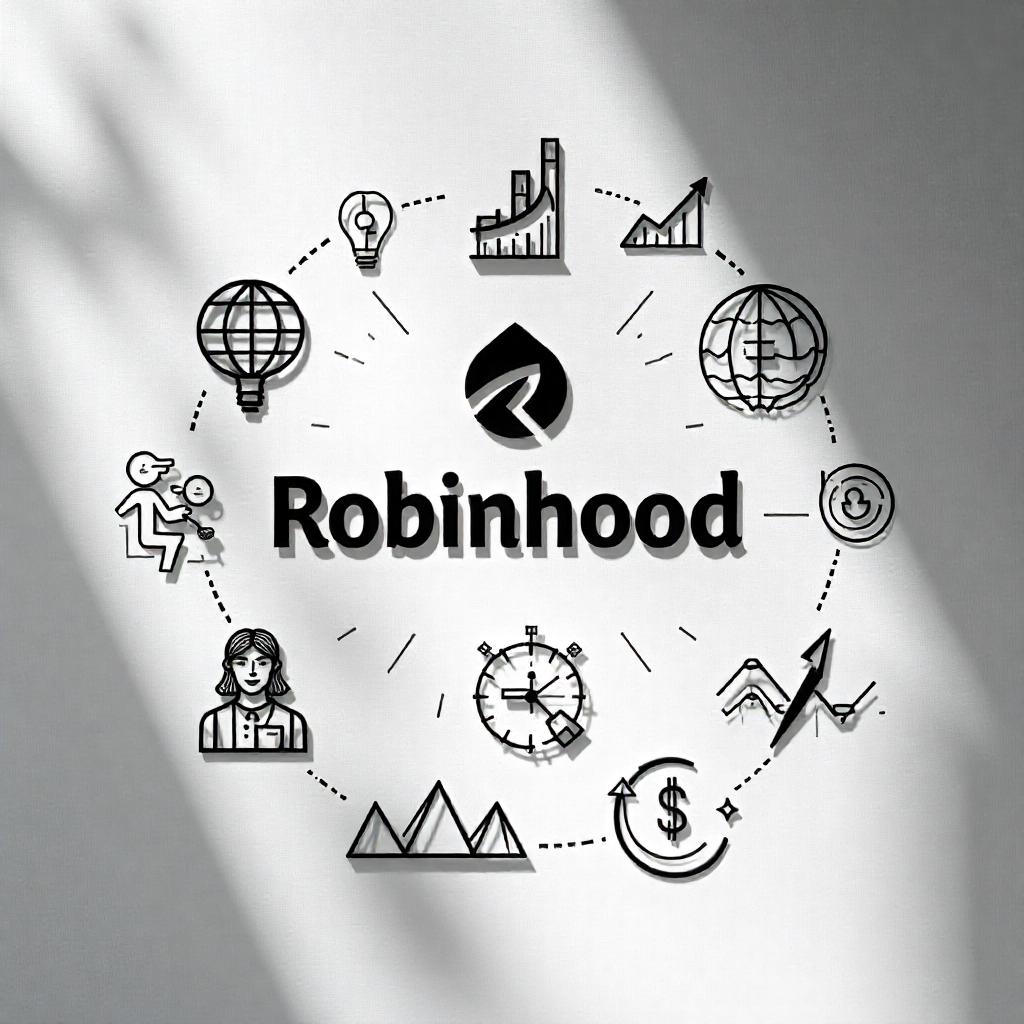Introduction to Robinhood
In recent years, Robinhood has emerged as a revolutionary platform in the world of stock trading. Founded in 2013 by Vladimir Tenev and Baiju Bhatt, Robinhood was designed to democratize finance for all. With its commission-free trading model, it has attracted millions of users, particularly millennials and first-time investors. This article delves into Robinhood stock, exploring its features, benefits, risks, and frequently asked questions (FAQs) to provide a comprehensive understanding of this investment platform.

What is Robinhood?
Robinhood is a mobile app and website that allows users to trade stocks, ETFs (Exchange-Traded Funds), options, and cryptocurrencies without paying any commission fees. The platform has disrupted traditional brokerage firms by making investing more accessible and affordable. Users can easily buy and sell stocks with just a few taps on their smartphones.
Key Features of Robinhood
- Commission-Free Trading: Robinhood’s most attractive feature is its commission-free trading. Unlike traditional brokers that charge fees for each trade, Robinhood allows users to trade without incurring any commissions. This feature significantly lowers the cost of investing, enabling users to keep more of their profits.
- User-Friendly Interface: The Robinhood app is designed with simplicity in mind. Its intuitive interface makes it easy for beginners to navigate and understand stock trading. Users can access vital information about stocks, including charts, news, and financials, all within a clean and straightforward layout.
- Fractional Shares: Robinhood allows users to buy fractional shares, enabling them to invest in high-priced stocks without needing a large sum of money. This feature is particularly appealing to new investors who may not have the capital to purchase full shares of expensive stocks like Amazon or Google.
- Instant Deposits: Users can access their funds immediately for trading, even before the money actually clears in their account. This feature allows for quick trades and increased flexibility, making it easier for investors to capitalize on market opportunities.
- Cryptocurrency Trading: In addition to stocks and ETFs, Robinhood offers users the ability to trade cryptocurrencies like Bitcoin, Ethereum, and Litecoin. This feature allows users to diversify their portfolios and explore the growing world of digital currencies.
- Market Data and Research: The platform provides users with access to real-time market data, news, and research, helping them make informed investment decisions. Users can track stock performance over time and receive updates on significant market events.
- Robinhood Gold: For a monthly fee, users can subscribe to Robinhood Gold, which offers additional features such as access to margin trading, professional research reports, and larger instant deposits. This premium service is designed for more serious investors looking for advanced tools.

How to Get Started with Robinhood
Step 1: Create an Account
To start trading on Robinhood, users must first create an account. This process involves providing personal information, including your name, email address, and Social Security number. Robinhood will also ask about your investment experience and financial situation. The account setup is straightforward and can be completed in just a few minutes.
Step 2: Fund Your Account
Once your account is set up, you’ll need to link a bank account to fund your Robinhood account. You can transfer funds instantly or use the standard method, which may take a few days. Robinhood typically allows users to start trading with a portion of their deposited funds almost immediately.
Step 3: Start Trading
With your account funded, you can begin trading. Simply search for the stock or ETF you wish to buy, select the amount, and place your order. Robinhood supports various order types, including market, limit, and stop orders, allowing users to tailor their trades to their strategies.
The Investment Process on Robinhood
Choosing Stocks to Invest In
Investing in stocks requires research and analysis. Users can utilize Robinhood’s built-in resources, such as news articles and stock performance charts, to aid in their decision-making process. Additionally, it’s essential to consider factors like company performance, market trends, and economic indicators.
Here are some tips for selecting stocks:
- Research the Company: Look into the company’s financial health, including its revenue, profits, and growth potential. Analyzing quarterly earnings reports and annual financial statements can provide valuable insights.
- Understand Market Trends: Stay informed about market trends that may impact the stock’s performance. Economic indicators, industry developments, and geopolitical events can all influence stock prices.
- Diversify Your Portfolio: Avoid putting all your eggs in one basket by diversifying your investments across various sectors. This strategy can help mitigate risks and enhance overall returns.
- Use Stock Screeners: Robinhood provides tools to filter stocks based on specific criteria such as price, market capitalization, and performance metrics. Utilizing these tools can help you identify potential investment opportunities.
Monitoring Your Investments
After purchasing stocks, it’s crucial to monitor their performance regularly. Robinhood provides real-time updates on stock prices and performance metrics, allowing users to make informed decisions about holding or selling their investments.
Consider setting price alerts for stocks you own or are interested in. This feature notifies you when a stock reaches a specific price level, enabling you to react promptly to market changes.
Selling Stocks
When it’s time to sell a stock, users can easily navigate to their portfolio, select the stock they wish to sell, and place a sell order. The process is as straightforward as buying a stock, and users can choose from different order types to suit their trading strategy.

Advantages of Using Robinhood
- Accessibility: Robinhood has made stock trading accessible to a broader audience, particularly younger investors who may have felt intimidated by traditional brokerage firms. The app’s simplicity encourages new investors to participate in the stock market.
- Cost-Effective: With no commission fees, users can keep more of their profits, making it a cost-effective option for investors. This feature is especially beneficial for those who trade frequently or are just starting.
- Educational Resources: Robinhood offers educational content that helps users understand the stock market and improve their trading skills. Users can access articles, tutorials, and webinars to enhance their knowledge.
- Community Features: The platform includes social features that allow users to share insights and strategies with others, fostering a sense of community among investors. Users can follow other traders and learn from their experiences.
- Investment Flexibility: The ability to trade stocks, ETFs, options, and cryptocurrencies provides users with a diverse range of investment options. This flexibility allows investors to tailor their portfolios according to their risk tolerance and financial goals.
Risks of Investing with Robinhood
While Robinhood offers numerous advantages, it also carries certain risks that investors should be aware of:
- Lack of Personal Guidance: Unlike traditional brokers who provide personalized advice, Robinhood users must rely on their research and decision-making skills. This lack of guidance can be challenging for inexperienced investors.
- Market Volatility: Stock prices can fluctuate dramatically, and investors may experience significant losses if they do not manage their portfolios wisely. Understanding market dynamics and having a solid investment strategy is crucial.
- Overtrading: The ease of trading on Robinhood may lead some users to engage in overtrading, which can result in poor investment decisions and increased risk. It’s essential to maintain a disciplined approach to trading.
- Limited Research Tools: While Robinhood provides some market data, it may lack the depth of research tools offered by traditional brokerage firms. Advanced investors may find the platform’s research capabilities lacking compared to other options.
- Regulatory Scrutiny: Robinhood has faced regulatory scrutiny in the past, particularly regarding its business practices and customer service. Investors should stay informed about any developments that may impact the platform.

FAQs about Robinhood Stock
1. Is Robinhood safe to use?
Yes, Robinhood is generally considered safe. It is a member of the Financial Industry Regulatory Authority (FINRA) and the Securities Investor Protection Corporation (SIPC), which protects users’ funds up to $500,000. However, as with any investment platform, users should exercise caution and practice good security measures, such as enabling two-factor authentication.
2. Can I trade options on Robinhood?
Yes, Robinhood allows users to trade options in addition to stocks and ETFs. However, options trading carries higher risks and may not be suitable for all investors. It’s essential to understand the complexities of options trading before diving in.
3. Are there any hidden fees with Robinhood?
While Robinhood does not charge commission fees, users should be aware of potential fees for certain services, such as margin trading or account transfers. Additionally, Robinhood may charge fees for specific types of transactions, such as wire transfers.
4. How does Robinhood make money?
Robinhood generates revenue through various means, including payment for order flow, interest on cash balances, and premium subscription services like Robinhood Gold. Payment for order flow involves receiving compensation from market makers for routing orders to them.
5. Can I use Robinhood for retirement accounts?
Currently, Robinhood does not offer specific retirement accounts like IRAs. However, users can invest for retirement using their standard brokerage accounts. It’s essential to consult with a financial advisor to determine the best retirement strategy for your situation.
6. What is Robinhood Gold?
Robinhood Gold is a premium subscription service that offers additional features, such as access to margin trading, professional research reports, and larger instant deposits. Users pay a monthly fee for these enhanced features, which can benefit more serious investors.
7. Can I withdraw my money anytime?
Yes, users can withdraw their funds at any time. However, keep in mind that it may take a few business days for the withdrawal to process, depending on your bank. Additionally, if you have open trades, you may need to close them before withdrawing funds.
Advanced Trading Strategies on Robinhood
As users become more familiar with the platform and the stock market, they may want to explore advanced trading strategies. Here are some strategies to consider:
1. Dollar-Cost Averaging
Dollar-cost averaging involves investing a fixed amount of money at regular intervals, regardless of the stock price. This strategy can help reduce the impact of market volatility and lower the average cost per share over time.
2. Swing Trading
Swing trading involves holding stocks for a short period, typically days or weeks, to capitalize on price fluctuations. This strategy requires careful analysis of market trends and technical indicators.
3. Options Trading Strategies
For those interested in options trading, several strategies can be employed, including covered calls, protective puts, and straddles. Each strategy has its risk profile and potential rewards, so it’s essential to understand them before diving in.
4. Diversification
Diversifying your portfolio by investing in different sectors and asset classes can help mitigate risks. Consider allocating funds across various industries, including technology, healthcare, consumer goods, and more.
The Future of Robinhood
As Robinhood continues to grow in popularity, it faces both challenges and opportunities. The company has announced plans to expand its offerings, including introducing new investment products and features. Additionally, Robinhood aims to enhance its educational resources to empower users with the knowledge needed to make informed investment decisions.
Conclusion
Robinhood has transformed the landscape of stock trading by making it accessible, affordable, and user-friendly. While it offers numerous benefits, such as commission-free trading and a simple interface, investors must also be aware of the risks involved. By conducting thorough research and staying informed, users can make the most of their Robinhood experience and potentially achieve their financial goals.
In summary, Robinhood stock trading represents a significant shift in the investment landscape, empowering individuals to take control of their financial futures. Whether you are a novice investor or an experienced trader, Robinhood offers a unique platform that caters to a wide range of investment needs.
As you embark on your investment journey, remember to set clear financial goals, stay disciplined, and continuously educate yourself about the stock market. With the right approach, Robinhood can be a valuable tool in achieving your investment objectives.


Pingback: Interactive Brokers: A Comprehensive Guide To Online Trading - Info Spher Hub
To start trading on Robinhood sounds simple, but I wonder how secure it really is to provide personal information like a Social Security number online. Instant funding sounds convenient, but does it come with any hidden fees or risks? I like the idea of real-time updates and price alerts, but how reliable are Robinhood’s resources for making informed decisions? The process seems straightforward, but what happens if the app crashes during a critical trading moment? I’m curious, has anyone experienced any issues with Robinhood’s customer support? Overall, it seems beginner-friendly, but I’d love to hear from someone who’s been using it long-term—what’s your take on its reliability and ease of use?